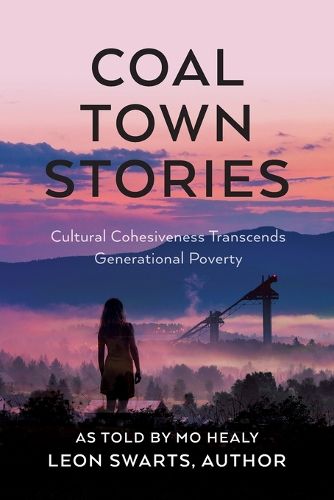Readings Newsletter
Become a Readings Member to make your shopping experience even easier.
Sign in or sign up for free!
You’re not far away from qualifying for FREE standard shipping within Australia
You’ve qualified for FREE standard shipping within Australia
The cart is loading…






This title is printed to order. This book may have been self-published. If so, we cannot guarantee the quality of the content. In the main most books will have gone through the editing process however some may not. We therefore suggest that you be aware of this before ordering this book. If in doubt check either the author or publisher’s details as we are unable to accept any returns unless they are faulty. Please contact us if you have any questions.
Writing stories about poverty has become my passion. Coal Town Stories is the third book I've authored. Two previous books, Follow Me and Together Again, were written from two different perspectives. The main character in Follow Me struggles with situational poverty for a short period, eventually overcomes its effects, and ends up with a successful career helping others who experience poverty. The main character in Together Again has a successful life and helps his lost brother survive poverty. Both books identify poverty as a source of alarming problems in America, like homelessness, addiction, alcoholism, and suicide.
Coal Town Stories adds a select geographic location in America to the plight of the poor. Poverty rates in coal-mining areas are generally higher than in non-mining areas of Appalachia and the nation. Poverty rates in Appalachia, Kentucky were 183 percent of the national average between 2012 and 2020, and the poverty rate in Kentucky's coal-producing counties is nearly double the national rate. Poverty rates have declined in recent years but remain higher than the rest of the nation. Areas with higher levels of mining activity have the lowest incomes and highest unemployment (Appalachian Regional Commission, Fourth Quarter, 2020).
A common thread exposed in all three books is the role of local, state, and federal government. Each book speaks to the government's need to identify policies and programs that will help reduce poverty in the long run. It is my hope that the books I write will expose the gravity of poverty in America and support long-term policies and programs that will offer hope for millions.
$9.00 standard shipping within Australia
FREE standard shipping within Australia for orders over $100.00
Express & International shipping calculated at checkout
This title is printed to order. This book may have been self-published. If so, we cannot guarantee the quality of the content. In the main most books will have gone through the editing process however some may not. We therefore suggest that you be aware of this before ordering this book. If in doubt check either the author or publisher’s details as we are unable to accept any returns unless they are faulty. Please contact us if you have any questions.
Writing stories about poverty has become my passion. Coal Town Stories is the third book I've authored. Two previous books, Follow Me and Together Again, were written from two different perspectives. The main character in Follow Me struggles with situational poverty for a short period, eventually overcomes its effects, and ends up with a successful career helping others who experience poverty. The main character in Together Again has a successful life and helps his lost brother survive poverty. Both books identify poverty as a source of alarming problems in America, like homelessness, addiction, alcoholism, and suicide.
Coal Town Stories adds a select geographic location in America to the plight of the poor. Poverty rates in coal-mining areas are generally higher than in non-mining areas of Appalachia and the nation. Poverty rates in Appalachia, Kentucky were 183 percent of the national average between 2012 and 2020, and the poverty rate in Kentucky's coal-producing counties is nearly double the national rate. Poverty rates have declined in recent years but remain higher than the rest of the nation. Areas with higher levels of mining activity have the lowest incomes and highest unemployment (Appalachian Regional Commission, Fourth Quarter, 2020).
A common thread exposed in all three books is the role of local, state, and federal government. Each book speaks to the government's need to identify policies and programs that will help reduce poverty in the long run. It is my hope that the books I write will expose the gravity of poverty in America and support long-term policies and programs that will offer hope for millions.